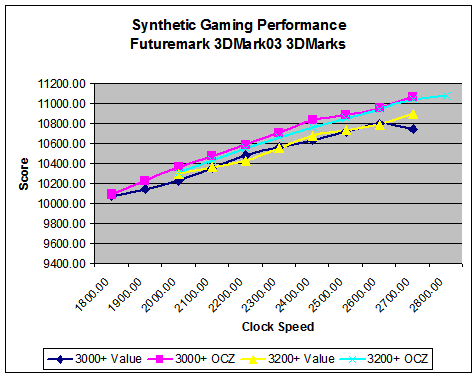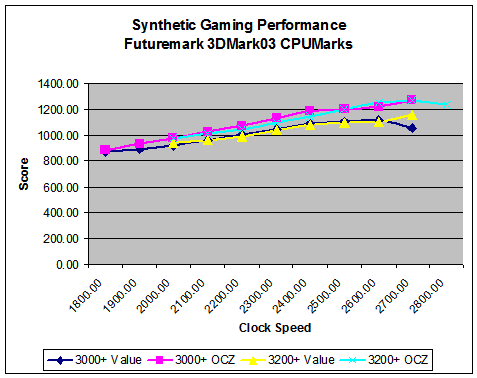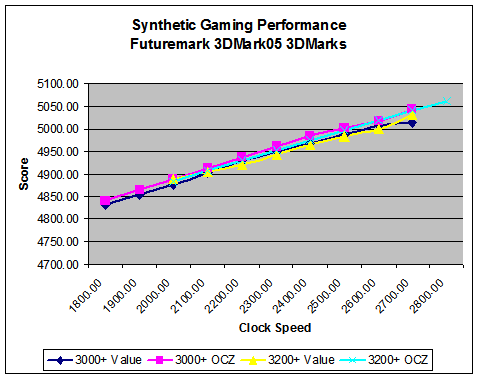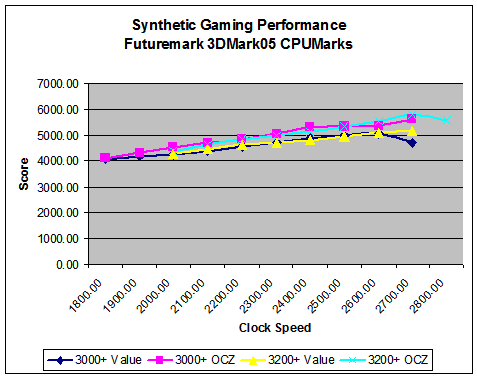Investigations into Socket 939 Athlon 64 Overclocking
by Jarred Walton on October 3, 2005 4:35 PM EST- Posted in
- CPUs
Synthetic Gaming Performance
We've already looked at some Futuremark performance numbers, and most people are already familiar with 3DMark. You'll note that we list 3DMark as a Synthetic Gaming benchmark. This is not meant as a slam on the application, but the truth is that games and graphics are so complex these days that the only thing that any benchmark can really tell you is how well that benchmark runs. Doom 3 says nothing about how Quake 4 will actually run on the same system; we'd assume it will be similar, but we won't know until it comes out and we can test it. If a game can't even give you sure knowledge of how other licensees of the engine will run, how can it possibly give you an insight into how a different engine will run? That's 3DMark in a nutshell: some games will correlate very well with the performance results and scaling that we see in 3DMark, and others will be completely different. The only thing that the benchmark shows for sure is how well it runs.
Starting with the 3DMarks results, note that both graphs start at non-zero values. The reason why this was done is to help show that there are actual differences, slight though they may be. In 3DMark03, the performance scales from 10073 to 11078 (10%). In 3DMark05, there's even less difference, as results go from 4833 to 5061 (5%). The difference between value RAM and TCCD maxes out at about 1.5% in 3DMark03 and less than .5% in 3DMark05. What all this means is that both of these tests are almost completely GPU limited with our X800 Pro. Using a 7800 GT or GTX would increase scores quite a bit, but even then, the 3DMarks scores are still mostly GPU limited - a typical problem of many synthetic benchmarks.
The good news is that we also get CPUMarks that largely remove the graphics card from the picture. The CPUMarks render a couple of the same tests as the 3DMarks portions of the tests, but they compute the transform and lighting operations and some other areas on the CPU rather than the GPU. The CPU tests are also multi-threaded, but the Venice chips don't gain anything from that. (If we were to compare the results with a Pentium 4 HT, the P4 tends to perform very well relative to actual gaming results.) The CPU scores are more in line with the other results that we've already seen, gaining 46% and 42% in 03 and 05, respectively.
Being able to run the entire 3DMarks03/05 tests from start to finish without crashing is once again a good indication of stability. We went a step further and looped the tests for eight hours or more on the top overclocks, without trouble... at least, without incident on everything 2700 MHz and below. The 2800 MHz overclock would crash after 30 to 60 minutes of looping, usually during the CPU portion of the test.
We've already looked at some Futuremark performance numbers, and most people are already familiar with 3DMark. You'll note that we list 3DMark as a Synthetic Gaming benchmark. This is not meant as a slam on the application, but the truth is that games and graphics are so complex these days that the only thing that any benchmark can really tell you is how well that benchmark runs. Doom 3 says nothing about how Quake 4 will actually run on the same system; we'd assume it will be similar, but we won't know until it comes out and we can test it. If a game can't even give you sure knowledge of how other licensees of the engine will run, how can it possibly give you an insight into how a different engine will run? That's 3DMark in a nutshell: some games will correlate very well with the performance results and scaling that we see in 3DMark, and others will be completely different. The only thing that the benchmark shows for sure is how well it runs.




The good news is that we also get CPUMarks that largely remove the graphics card from the picture. The CPUMarks render a couple of the same tests as the 3DMarks portions of the tests, but they compute the transform and lighting operations and some other areas on the CPU rather than the GPU. The CPU tests are also multi-threaded, but the Venice chips don't gain anything from that. (If we were to compare the results with a Pentium 4 HT, the P4 tends to perform very well relative to actual gaming results.) The CPU scores are more in line with the other results that we've already seen, gaining 46% and 42% in 03 and 05, respectively.
Being able to run the entire 3DMarks03/05 tests from start to finish without crashing is once again a good indication of stability. We went a step further and looped the tests for eight hours or more on the top overclocks, without trouble... at least, without incident on everything 2700 MHz and below. The 2800 MHz overclock would crash after 30 to 60 minutes of looping, usually during the CPU portion of the test.










101 Comments
View All Comments
Powered by AMD - Monday, October 3, 2005 - link
Do not forget The Athlon XP 1700+ 1.5Volts, DLT3C, mines is OC from 1467 Stock to 2250 Mhz and pretty cool with an old Thermaltake Blower...It can ever reach 2450 Mhz but with 1.8 Volts.
hey, at 2250 Mhz its a 53% OC too!!
Great article but it will be useful for me only when I need an Athlon 64 :p
donkeycrock - Monday, October 3, 2005 - link
i noticed that frys is selling x-connect (500 Watts)psu for 25 dollars after rebate. it is extremely heavy, and not many reviews say if they are very good PSU's for overclocking, anybody have knowladge about this PSU.thanks
brad
cryptonomicon - Monday, October 3, 2005 - link
nice article jarred, and you worded the disclaimers perfectly, bravo.and its nice to see those ram comparisons. good to see those results on the latest a64 platform and confirm once again that the ram makes only a few percentage points difference, if that. shelling out all your dough on a good GPU, then buying the lowest model venice, a DFI board, and value ram is the way to go.
Googer - Monday, October 3, 2005 - link
http://www2.amd.com/us-en/assets/content_type/Down...">AMD Thermal Grease List PDFRupertS - Wednesday, October 26, 2005 - link
Interesting, AMD only recommends thermal grease for short term use 'where the heat sink is removed and attached multiple times over a short period'. They definitely do not recommend it for long term use.StriderGT - Monday, October 3, 2005 - link
Both me, Zebo and many others have clarified long time ago in Anands forum the pointless struggle of purchasing extreme memory parts in Athlon64. Dividers and value ram will do the trick of excellent ocing giving you 95%++ of the performance someone gets with expensive and overvolted ram modules. Nice seeing anandtech come up with an article backing up the threads like this one (http://forums.anandtech.com/messageview.aspx?catid...">http://forums.anandtech.com/messageview...mp;threa...PS For those owning MSI Neo3 m/bs -and even the rest- I have created back then an excel calculating the actual memory frequency with the various BIOS settings. Enjoy
http://www.geocities.com/gtstrider/">http://www.geocities.com/gtstrider/
JarredWalton - Monday, October 3, 2005 - link
Yeah, I've seen quite a few threads around the 'net on this, but AT hadn't covered it very well, and I hoped to get something "official" out there. (None of the enthusiast sites have really covered this that well, as far as I could see.) Since I've been fooling around with various AMD CPU overclocks for a year now, I figured others might like to see the possibilities. High-end, high-cost is well and good for dreams, but like most people I live a bit closer to reality. $200 is about as much as I'm willing to pay for a CPU in most cases.andyc - Monday, October 3, 2005 - link
So you can basically overclock the 3000 to the same speeds the 3200 can? So it's not even worth it to go with the 3200?JarredWalton - Monday, October 3, 2005 - link
Well, perhaps. 9x300 requires a better motherboard than 10x270, though most boards than can handle 270 MHz CPU bus speeds will also handle 300 I think. For value overclockers, though, I don't think I'd bother spending the extra $50 on the 3200+, no. Spend it on the GPU instead (if you play games).Mogadon - Monday, October 3, 2005 - link
Great article Jarred, thanks for putting in all the hard work and time.I have one question regarding voltages. As I understand it, you wouldn't recommend running a VCore above 1.65V for a long term overclock. I understand the warnings and possible effects on the CPU with running a high VCore but I wanted to know if this is around the VCore that you would run on, say, your overclocked system?
The majority of people on the forums here don't really recommend going above 1.55V or 1.6V, i was wondering if you had any comments about this.